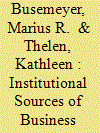| Srl | Item |
| 1 |
ID:
173638


|
|
|
|
|
| Summary/Abstract |
Recent years have seen a revival of debates about the role of business and the sources of business power in postindustrial political economies. Scholarly accounts commonly distinguish between structural sources of business power, connected to its privileged position in capitalist economies, and instrumental sources, related to direct forms of lobbying by business actors. The authors argue that this distinction overlooks an important third source of business power, which they conceptualize as institutional business power. Institutional business power results when state actors delegate public functions to private business actors. Over time, through policy feedback and lock-in effects, institutional business power contributes to an asymmetrical dependence of the state on the continued commitment of private business actors. This article elaborates the theoretical argument behind this claim, providing empirical examples of growing institutional business power in education in Germany, Sweden, and the United States.
|
|
|
|
|
|
|
|
|
|
|
|
|
|
|
|
| 2 |
ID:
138265


|
|
|
|
|
| Summary/Abstract |
This article explores the potential impact of increased school choice, specifically of proposed charter (partnership) schools, on educational inequality in New Zealand. An initial review of the educational marketplace literature proves inconclusive as to whether privatised schooling is capable of reducing disparity in academic outcomes and broader social contexts, and even suggests it might further increase segregation. Subsequently, the article presents a case study of educational inequality in Chile (1990–2010) to set up a comparison of an education system that has become increasingly market based and unequal. The 20-year time frame was selected to cover the shift to decentralised education under Pinochet until the large-scale breakout of student protests against systemic inequality, known as the ‘Chilean Winter’. In conclusion, the article suggests that a successful strategy to counter educational disparity needs to create viable alternatives to a free-market approach and, as such, it appears that there are important lessons that New Zealand can learn from the Chilean Winter – lessons that go beyond the implementation of charter schools to fundamental social structures.
|
|
|
|
|
|
|
|
|
|
|
|
|
|
|
|